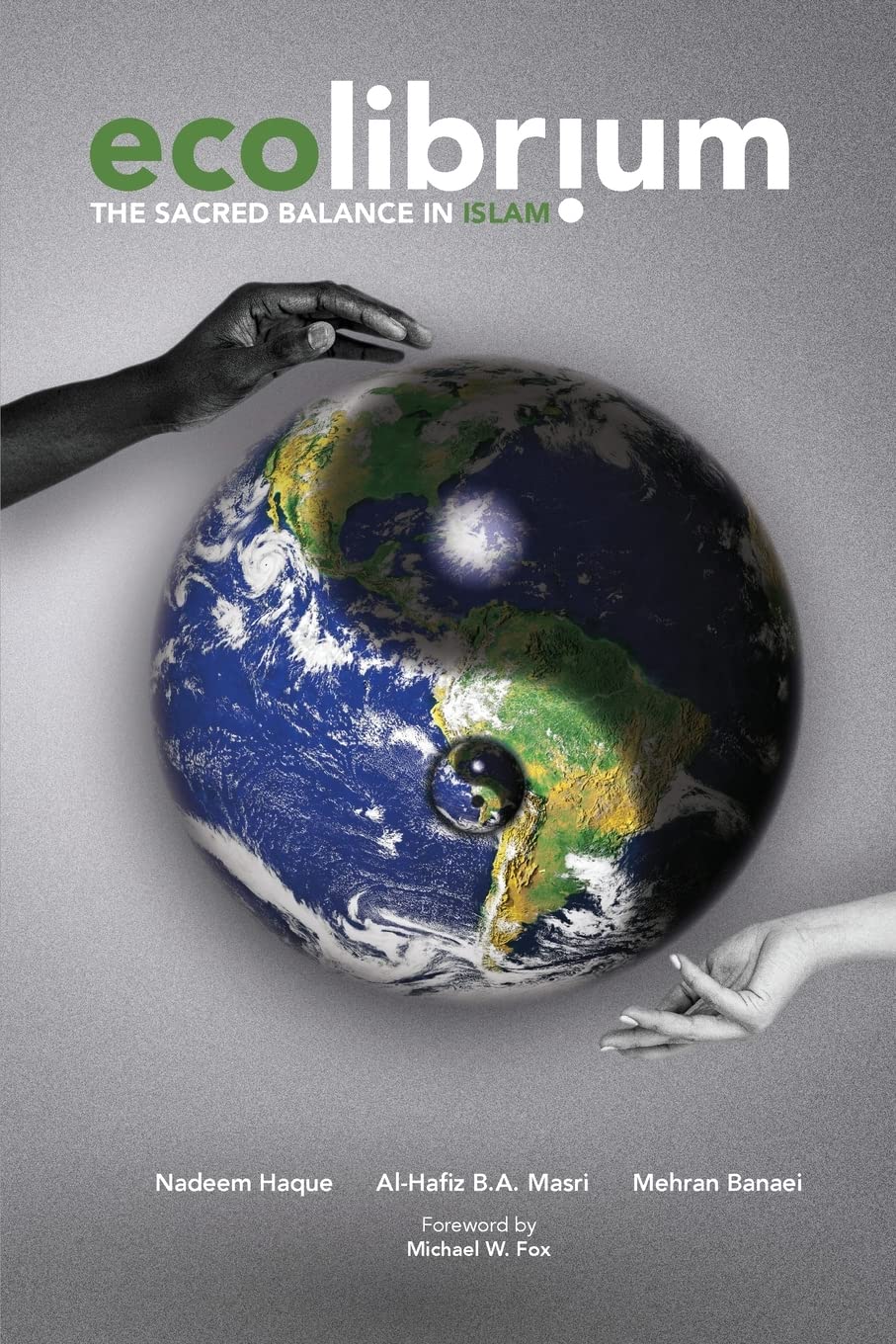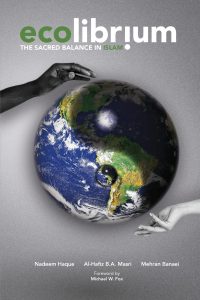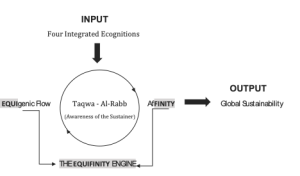We warmly welcome Nadeem Haque, author of Ecolibrium: The Sacred Balance in Islam, as our featured author for August. In his book, Nadeem calls for a radical transformation in the relationship we have formed with ecology and the universe itself. He argues that it is time for a fully integrated approach to the environment that encourages respect for the environment as a sacred entity. In his article here, Nadeem outlines the Quranic perspective on the environment to demonstrate how this way of thinking may be achieved. While there is a sense of hope in this message, the urgency on which we must act is at the forefront of Nadeem’s writings.
Interact with Nadeem on our AoM Forum here.
“A thought provoking book…[that] makes an important contribution to the field of Islamic ecology” Founder, Dr Muzammal Hussain, Wisdom in Nature (WiN).
Ecolibrium: The Sacred Balance in Islam, by Nadeem Haque, Al Hafiz B.A. Masri, Mehran Banaei
Foreword by Michael W. Fox
Book Summary & Discussion by Nadeem Haque
Background
The idea to write the book Ecolibrium: The Sacred Balance in Islam was based on an initiative taken 33 years ago (around 1989). In fact, it was even earlier, in 1985, that I expressed to my late grandfather, Al Hafiz B.A. Masri (residing in England), the pioneering researcher of Animal Welfare and Islam, and former (Sunni) Imam of the Shah Jehan Mosque in the 1960s in England, (the Central Mosque in terms of international influence in Europe), the vital need for such a book. He had already written the book Animals in Islam, published by Compassion in World Farming. The research began in 1989, but Masri passed away in 1992. Undaunted (though, of course, sad), I continued developing the short and simple manuscript he had started to put together on Islam and the Environment until the book – Ecolibrium – was finally published decades later, in November 2021, with a third author, Mehran Banaei, who was brought in. Mehran had been a co-author with me on From Facts to Values: Certainty, Order, Balance and their Universal Implications (published in 1995, Optagon, Toronto), so it was a natural collaboration. I would like to briefly, yet concisely, discuss the main concepts in Ecolibrium and also – at the end of this summary – link them to the increasingly vindicated exploratory work of Graham Hancock and my paper previously published concerning History and ‘pre-ancient’ civilizations that connects to Ecolibrium.
Overview
The prime focus of Ecolibrium is on the Quranic, and hence Islamic, view on environmental/ecological welfare/human development, where in so doing, we present the precepts and applications of a totally rational belief system, where essentially, the distinction between religion and secularism is shown to be utterly meaningless. It is demonstrated that the optimal solution to our mounting socio-environmental problems is achievable if only we were to return to an integrated way of thinking and living, and of indeed organizing human society, so that it organically co-evolves as a natural component of the panoply of the rest of creation. Over the decades of thinking about this critical subject, the book finally evolved into nine chapters: 1: The Etiology of Devastation; 2: The Foundations of Animal and Ecological Rights; 3: The Islamic View of Nature; 4: The Use of Nature 5: The Islamic view of the Animal Kingdom; 6: Animal Afterlife; 7: Equi-nomics: “Equi-nomics: The Optimally Balanced Economic System for Humanity and Nature”; 8: The Overpopulation Myth and 9: A Worldview Founded on Nature.
Briefly, Chapter 1 opens up our thinking to socio-environmental concerns and sets the stage, asking questions about nature and its purpose and then delves into what has mired us to suffer the odious quagmire of environmental destruction – the etiological nexus. Chapter 2 establishes, using nature itself, the foundations of its rights. The next few chapters provide an integral and global solution for local and global issues covering several areas with respect to the environment and animals, such as: economics, animal welfare, animal communication and intelligence, the use and development of technology, neglected areas of the history of science, the history of human development in relation to the purpose and goals enunciated in the Quran, theodicy etc. In the ninth and final chapter, having equipped the readers with the knowledge of Islam and its approach to nature, we further discuss, in a free-flowing form, how and why it is that Islam, as described in Ecolibrium, is, tragically, the most misunderstood belief system! We show that, in reality, it is a belief system founded on nature itself, whose principles can greatly mitigate our multifarious interconnected problems, if not completely resolve them. In order to achieve Ecolibrium on Earth, one needs to follow a precise guideline and understand a series of vital concepts, all of which are integrally interconnected via a precise ‘formula’. In this article, we concentrate on only the key concepts of the ‘formula’.
The main concepts discussed are as follows: Islam is regarded in the Quran (its primary textual source) as a natural belief system founded on nature (in Arabic: fitrah). Furthermore, in the Quran, nature is spoken of profusely, not only as a pointer to God (a singular non-anthropomorphic ‘non-localized entity’) but also as a source of sustainability for all creatures that inhabit this vast universe. To this extent, Ecolibrium shows that the Quranic system does not separate the ‘religious’ from the ‘sacred’, for everything is sacred in the sense that it is honoured and respected as the creation of God. What is more, is that the Quran is centralized on the concept of al-mizan (the Arabic word for ‘the balance/equilibrium’). The book illustrates that this key concept is essential to realizing the Equigenic Principle as a corrective for destructive human behaviour that is creating havoc on the Earth. The Equigenic Principle is defined and illustrated as the fulcrum for three other ‘ecognitions’ (ecological recognitions): ‘Ownership of God’, ‘Sentient Species Communities’ and ‘Personhood’. More on this later.
In addition, it is also shown that a proper understanding of ‘consciousness’ and directed macroevolution is governed astonishingly by a single word in Arabic: Rabb. This word essentially means developing or evolving something unto perfection or completion. Recognition of this reality, we claim, helps to integrally tie together all of creation into a Supra Community that naturally has an affinity. In fact, the concept of affinity and the four ecognitions (in particular the Equigenic Principle) are the basis for restructuring a human relationship with the cosmos that leads to both justice and peace – in other words, Ecolibrium: the sacred balance in Islam, the book’s title. Following Ecolibrium would lead humanity towards a much-needed level of Global Sustainability which I define as the equitable distribution of resources worldwide that do not harm the balance and maintain not only human communities in a state of equilibrium but so too animal communities.
The state of Ecolibrium (the balanced dwelling place) applies not only to Muslim societies but to all societies globally because the Quran – purported by Muslims to be the revelation from God – addresses the totality of humanity and not just ‘Muslims’. Also, logically speaking, a supposed global approach’s effectiveness becomes limited if not realized or applied universally; in fact, it would be a contradiction in terms. This Quranic paradigm, so to speak, possesses several key features that would bring about the essential Ecolibrium through a rational and integrated belief system. In current parlance, an extended concept of Ecolibrium can be defined as sustainable development for humans, animals and the environment/ecology that is sustained over multiple generations globally, which tries to maintain, without force, physical or psychological threat or pressure, the health of all these entities and systems, or enhance them, in an organic and egalitarian manner without elitism, speciesism or ‘racism’, so that such an altruistic, caring and concerned society emerges. The Quranic Paradigm that engenders Ecolibrium turns out to be a formula that one could derive using logic and the observation of nature, but one which is spelt out in the Quran for our benefit once we study the Quran deeply and extensively. What is this specific formula that, if utilized, would produce Ecolibrium as defined above?
Defining the Formula for Ecolibrium: The Ecognitions
It might appear strange to many that a ‘religion’ has a formula that deals with human development and behaviour; however, the plain fact is that the Quran deals explicitly with cause and effect relations in all spheres of life. From the Quran, many relations can be deduced, and Ecolibrium is one of them. The basic formulaic relationship for Ecolibrium is as follows:
Ecolibrium =Implementing (Ecognition 1 + Ecognition 2+ Ecognition 3 + Ecognition 4)
as applied to: Animal Welfare; Human Development; Economics/Industry/Technology/ Environmental (Biospherical/Ecological) Welfare.
The philosophical justification and basis for Islamic human, environmental and animal advocacy consist of the following principles in the ‘formula’, which recognize and uphold inherent ecological values derived from the Quran, where ‘ecognition’ stands for ecological recognition. We shall be examining some key ingredients that make up this formula; one could say they are the ‘constants’ of this formula, analogically speaking.
Ecognition 1: All Nonhuman Animals are a Trust From God:
The Quranic view is that we human beings, as finite and dependent creatures, cannot claim to be the ultimate owners of things in nature. Indeed, in this sense, our right to use natural resources is usufruct – as if one had been given the right to use another’s property with the clear understanding that one would not damage, waste or destroy its substance. The Quran, moreover, points to a Singular Intelligence as the Originator and Creator of the Universe. Logically speaking, nature does not appear to have a conscious self by which it is organizing its “self” toward a future state, so this organization is therefore attributed to a Creator:
.. do they not look at the starry firmament, how it is raised up? At the mountains, how are they stabilised? And at the Earth, how is it spread out? (88 : 18,19).
In the creation of the universe and the Earth, in the sequence of night and day, in the vessels that ply through bodies of water carrying beneficial cargo for mankind; in the rain that God causes to descend from the clouds – thereby regenerating the dead soil and dispersing all manner of animals – in the regulation of the air currents that circulate between sky and earth – surely in all these there are manifest pointers for those who would take thought.
Humankind is given only temporary stewardship – “khilafah” – of the natural world.
Therefore, humankind is responsible and accountable for any abuse of the Earth’s life forms and natural resources. If nothing belongs to us and is essentially entrusted, then we are accountable as trustees to the owner. (In chapter 33, verse 72, it speaks of the trust that humans take on but do not fulfil). We cannot be arrogant because, ultimately, we possess nothing.
Ecognition 2: Equigenic Rights Do Exist and Must be Maintained
We have become so used to thinking in terms of human rights that we tend to ignore the rights of other creatures and of nature in general. These domains are ultimately indivisible, as evinced by the “Equigenic Principle”, that is, the equality and balance inherent in nature. The measure of the health of society is a measure of how close we are to realising this principle. Unfortunately, though, in the nominal Muslim world, with the un-Quranic depreciation of the rational worldview, the “book” and the equigenic “balance” have been separated. In Islam, inherently then, nature is the primary revelation, and the Quran is a mirror of such. This realization has immense implications for how society ought to structure itself and deal with the myriad other creatures that inhabit the Earth. To support the environment, we need to develop an outlook that is well-interconnected and does not, therefore, artificially bifurcate knowledge into sacred and non-sacred. Concern for the environment makes everything sacred, fostering inherent respect for nature. The Quran, as such, deals with all spheres of life and has an interwoven structure for creating a healthy Supra Community in which all economic, sociological, legal, and technological systems are integrated appropriately. These interlinked systems evolve from a socio-ecological foundation of balance – mizan.
Equigenic Rights stem from the Equigenic Principle (“equi” meaning equal in Latin, and “genic” meaning start of change/origin). We came up with such terminology to distinguish from “natural rights”, which tend to convey nature, in Hobbesian guise, as being “brutish”. Indeed, the very notion of “rights”, in connection with animals and nature, still conjures up a perception which seems incongruous for many because humans have disconnected themselves from the realisation of proper interconnectivity between nature and society. In fact, most human societies worldwide have lost touch with such a balance. The universe itself, we argue, was created as a test to see who would perform the best in deeds; that is, who would abide by the laws of God, the first of which is not to upset the pre-existing balance, or Equigenic Principle:
It is He (God) who has created the expansive universe and established the balance – al-mizan – so you may not disrupt it (55:79) .. for the maintenance and development of sentient life forms, both human and non-human (55:10) .. and the Balance so that human beings may behave with equity (57 : 25).
According to the Quran, human beings must be neither dominant nor subservient to nature. Rather they are to act as integral parts of the patterns in the fabric of nature. Humans are not unique, therefore, as sentient forms of life but are a class of species in the cosmos who can either be a creative or a destructive force in nature. They are responsible for the safekeeping of the intrinsic balance of nature. The Quran reminds people that all the components of the ecosystem have a unique function; each part plays its unique role in the ecological cycle.
With the Islamic approach, the basis of which is the Equigenic Principle, man is not anthropocentrically judged to be at the centre of the universe. Nature is seen as our teacher, teaching us reflexively how we should conduct ourselves and teach each other. Moreover, reflecting on the expanding universe and the diversity of its life forces, we can certainly observe a panoramic display of remarkable order and consistency in its laws. Such harmonious order is maintained throughout the earth’s domains by the structure of extremely delicate balances in the physical universe, where plants and animals have been designed to be ingeniously adapted to their respective niches. There is indeed a fragile equilibrium whereby even a minute change would disrupt the balances in this dynamically interrelated scheme of existence.
In Figure 1, the path to peace with the central concept of Mizan (Balance) is depicted, where the causal connections to peace are universal, logical and immutable:
Reason → Cognizant → Notice Design → Put Things Where They Belong → Mizan → Justice → Peace
Fig. 1
The Equigenic Use of Technology
From the Quranic perspective, sustainability is hinged, crucially, on how we develop and utilize technology. Quranic technology based on al-Mizan would be focused on cyclical components that integrally connect to the grand cycles of nature. Moreover, this focus would make us learn more about the technology of nature, which is infinitely superior to man-made technology. This is because Muslims are reminded of the verse in the Quran that says that God is the best of Creators. In essence, the true nature of technology is the technology of nature, and we must therefore learn to develop with the rhythms, structural patterns and cycles that maintain the diversity and dynamically flowing balance of nature. This is extensively discussed in Ecolibrium.
Ecognition 3: All Nonhuman Animals Live in Communities :
The Quran seals the biological parity between humans and the rest of the species :
There is not a nonflying and two-winged flying (water/carbon based) creature, but they are in communities like yourselves (6 : 38)
God has appointed, precisely established and positioned the Earth (both the planet as a whole and the Earth’s crust itself) for the maintenance and development of sentient life forms – both human and non/human (55 : 10).
This refers to the realization that animals, like humans, exist in communities that must be respected in their own right because of Ecognition 2 and 4.
Ecognition 4: All Nonhuman Animals Possess Personhood:
Human beings tend to regard themselves as special because they feel they are uniquely endowed with intelligence, self-awareness, higher communication abilities, and a soul. Using such assumptions, humans often trample upon other species because they think nonhumans do not possess such abilities, or if they do, they exist in a primitive state. The Quranic outlook reveals that these assumptions are incongruent with reality and that great untapped knowledge exists in relation to such a nonhuman context, which could lead to a revolution in the largely discordant relationship between man and nature. In the book, Ecolibrium, it is shown that in the Quran, animal communication is described for ants and birds, showing them to have sophisticated forms of communication akin to human language. In this area, as in many others, linguists have not reached the far-flung conclusions in the Quran but appear to be approaching it. In Ecolibrium, examples of sophisticated language having sentential structures and imports are provided. Personhood and its respect are important because it is that and the role of the ‘person’ that comprises the community. The person shapes the community as well as being shaped by the community.
The Ecognitions lead to a New Economics: Equigenical Economics – Equi-nomics
Equi-nomics, is geared toward maintaining the Equigenic Principle. It is an economic system whose time is long overdue, as it is one that can foster the development of the four above ecognitions (ecological recognitions). These ecognitions, if followed, comprehensively embrace both nature and humanity, leading ultimately to justice and peace. There are certain indices that can be utilized to measure the degree of ‘Equigenicity’ of society (through the Equigenic Index). These are discussed in the book Ecolibrium, and they are as follows:
From an Islamic perspective, it is not enough to think in terms of only human rights, ignoring the rights of other creatures. The Equigenic Principle that leads to Equi-nomics refers to the use of nature as the foundation of rights realized when human beings, using reason, that is, by properly interconnecting things, recognize the dynamic balance in nature. Indeed, the measure of the health of a society is an indicator of how close we are to applying this principle. Needless to say, we are currently very far from this application!
Rise of the Ecological Age
In a chemical reaction of a world-class inimitable beverage, a formula implies specific ingredients, transformation and precision. Likewise, without following the precise concepts and precepts outlined above, we cannot achieve Ecolibrium or a high level of such egalitarian sustainability because the outcome requires a specific series of logical realizations and actions. Thus, we would either be falling short in many areas or totally failing, bereft of the ingredients and formula. Furthermore, Ecognitions 1 and 4 – which are the key ingredients of the formula – cannot be fully understood without understanding the Concept of “Rabb”, which according to the scholar/linguist Al-Raghib Al-Isfahani, means the developer of a thing from one stage to another until it reaches perfection (completion). In turn, this term cannot be fully understood without understanding that it refers to two realities: Consciousness sustained and macroevolution of all species, including humans. My recent research on the Quran and on the origination of life has illustrated that all life, including that of humans, has evolved from water and clay and originally from stardust. Consequently, everything is related to each other through the convergence of origin, including humans – there is no exceptionalism in this. In addition, all consciousness is derived from the Consciousness (of God) – in that sentient consciousness accesses this consciousness from God.
The concepts discussed above produce affinity or closeness and have the power to change society holistically. In fact, the concept of Personhood (ecognition 4) in relation to consciousness and creative evolution produces “Affinity”. At the same time, the Arabic word Rabb, as Sustainer, espouses creative evolution, reinforcing the common source of all creation. Here is a relationship between the ingredients of the ‘formula’:
EXISTENCE OF GOD: Conclusive Proofs linking space to the Person of ‘God’
↓
NATURE OF GOD: Realization of the relation between consciousness and consciousness
↓
AFFINITY: Realization that all entities are imagined creations accessing the same consciousness to gain individualized consciousness and the common origin of all species based on directed/teleological macroevolution
↓
EMPATHY: Naturally developed due to closeness from Affinity
↓
COMPASSION: Naturally developed from Empathy
↓
JUSTICE: Concern develops as compassion motivates a person to establish justice
↓
PEACE: Can only arise from justice
Fig. 2
Therefore, given all these factors, as well as the mental and dexterous abilities of different lifeforms, we can argue that the entire universe has been created for testing highly intellectually capable carbon (human and extraterrestrial life forms) and non-carbon-based entities to see if they can choose to minimize going against the equigenic flow (concepts and energies, physical and mental leading to and maintaining al-mizan), that is, to see who can choose to develop the equigenic flow and affinity. In Figure 3, the self-reinforcing and interdependent quality of both these concepts is illustrated – the Equifinity Engine:
Fig. 3: Global Sustainability Concepts for the 21st Century and Beyond: ‘The Equifinity Engine’.
Taqwa (of One God) means consciousness, in the sense of being acutely and expansively aware. In this case, it is Taqwa, of an attribute of the Creator (i.e. Rabb). Analogically speaking, if the engine ceases or ebbs away, so do the Equigenic Flow and Affinity, diminishing or destroying Global Sustainability. As such, the Equifinity Engine is the Driver of Global Sustainability. An analogy is provided here with a water wheel.
The Islamic view, in the final analysis, is that this Universe has been designed to test intelligent beings such as humans in order to see if they will uphold the balance (the equigenic flow) and show affinity. In fact, human nature, reason, the book of the universe and the Quran interweave a seamless fabric of a teleological and equigenical cosmos. For American historian, Lewis Mumford said:
The cycle of the machine is now coming to an end .. man is at last in a position to transcend the machine, and to create a new biological and social environment, in which the highest possibilities of human existence will be realized, not for the strong and lucky alone, but for all co-operating and understanding groups, associates and communities.
History has the potential to illuminate the future
How does all of this connect to Graham Hancock’s work on our distant past? Although it is not explicitly discussed in Ecolibrium, it was discovered by this writer that the Quran contained written evidence of a global and highly advanced civilization that pre-existed ours and affected all other less advanced civilizations that arose later on. This was published and claimed to have been proven in my paper, Future Implications of a Pre-Adamic, Global, High Ancient Civilization, first published in the Scientific GOD Journal, January 2012, Vol. 3, Issue 1, pp. 20-40 and re-published on Hancock’s website. In a nutshell, this paper claims that in the Quran, this rational yet wholly ‘spiritual’ system was global and that the adherents of that civilization followed their own scripture at the time. However, their united world fell apart through mutual rivalry due to internecine strife except for a few who remained truthful and just. After this point, messengers were sent to humanity as guides in a world that was no longer united as one but had lapsed into various competing tribes and nations.
Humanity now has the potential to live in peace and harmony as a global civilization that lives with nature rather than against it by observing the four ecognitions that lead to the equigenic flow and affinity, both being the products and sources of the ‘formula’, as it were.
The thrust of the message of the Quran is to foster a Supra Community, which is defined as the singular united community of humankind intervolved with the rest of the communities of animals on the Earth, just as it was in the beginning. Tragically, humanity swayed from this integral message of their precious yet derided and neglected sages and prophets, whose pristine and beneficial messages were blatantly distorted and continue to be with unrepentant flagrancy. But be not dismayed: vital lessons can be learned from both nature and history. In an age where we have unprecedented means of destruction, we also have extraordinary methods of communication and connection. If we are willing to learn, all of this can lead to a better trajectory against a fast-moving downward spiral – the trajectory of Ecolibrium: The Sacred Balance in Islam.
Bibliography
Banaei, Mehran and Haque, Nadeem. (1995). From Facts to Values: Certainty, Order, Balance and their Universal Implications, Optagon Publications Ltd., Toronto.
Haque, Nadeem, Masri, Al-Hafiz B.A., and Banaei, Mehran. (2021). Ecolibrium: The Sacred Balance in Islam. Beacon Books, Manchester.
AMAZON LINK
Haque, Nadeem and Masri, Al-Hafiz Basheer Ahmad. (2011). “The Principles of Animal Advocacy in Islam: Four Integrated Ecognitions”, Society and Animals, 19: 279-290.
Haque, Nadeem and Shahbaz, Zeshan. (Aug. – Sept. 2015). “Extraterrestrials and Intraterrestrials in Islam”, Nexus Magazine.
(99+) Extraterrestrials and Intraterrestrials in Islam | Nadeem Haque – Academia.edu
Haque, Nadeem, Future Implications of a Pre-Adamic, Global, High Ancient Civilization, Scientific GOD Journal, January 2012, Vol. 3, Issue 1, pp. 20-40











Looking forward to reading the book with strong interest.
Wish more Muslims (those who believe in Muhammad and those who do not) delve into the Qur’an to see its relevance to today’s problems.
Omar M. Ramahi
Thank you Omar, for your comments – I really appreciate it. I have read your book that also focuses – like Ecolibrium – on the Quran. I hope that such books on Islam will show this belief system in its true light. (Professor Omar Ramahi’s book is: “Muslims’ Greatest Challenge: Choosing Between Tradition and Islam”. I consider it essential reading for all those interested to know about Islam, the challenges of its adherents and prospects for the future).
Nadeem Haque